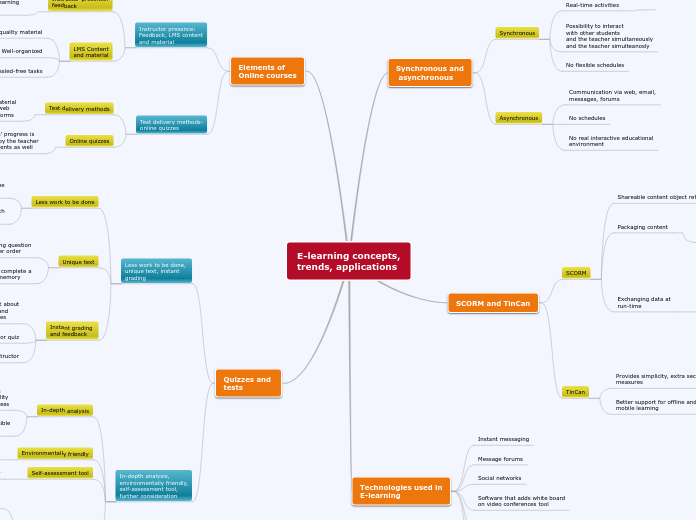E-learning concepts,
trends, applications
Synchronous and
asynchronous
Synchronous
Real-time activities
Possibility to interact
with other students
and the teacher simultaneously
and the teacher simulteanosly
No flexible schedules
Asynchronous
Communication via web, email,
messages, forums
No schedules
No real interactive educational
environment
SCORM and TinCan
SCORM
Shareable content object reference model
Packaging content
A file which contains every
piece of
information required
by the LMS
Exchanging data at
run-time
Delivery and tracking data and
content
Content can be used in
many situations
Find content for LMS
Get and set calls
Associate vocabulary
Content can be sold and delivered
to the user more quickly, more
efficiently, and at a lower
price.
TinCan
Provides simplicity, extra security
measures
Better support for offline and
mobile learning
Technologies used in
E-learning
Instant messaging
Message forums
Social networks
Software that adds white board
on video conferences tool
Screen-sharing
Data bases
Elements of
Online courses
Instructor presence:
Feedback, LMS content
and material
Instructor presence:
feedback
Encourage, inspire
and ensure learning
process
Through instant messages
and e-mail
LMS Content
and material
High quality material
Well-organized
Hassled-free tasks
Test delivery methods-
online quizzes
Test delivery methods
Availabilty of material
posted in each web
browser or platforms
Online quizzes
Students' progress is
tracked by the teacher
and students as well
Quizzes and
tests
Less work to be done,
unique text, instant
grading
Less work to be done
No specific hour or time
for testing
Automated corrections with
a LMS
Unique text
Randomizing question
and answer order
Avoid to complete a
test by memory
Instant grading
and feedback
A comment about
strengths and
weakenesses
Multiple choice test or quiz
Saves time for the instructor
In-depth analysis,
environmentally friendly,
self-assessment tool,
further consideration
In-depth analysis
Thtough graphic organizers
the teacher has the possibility
to analize scores and progress
See trends and posible
improvements
Environmentally friendly
Less use of paper
Self-assessment tool
Results instantly
Further consideration
Different kind of tools
to assess students' progress
Look for needs
of different learnig styles
Vary type of test
and quizzes
Learners encouragement
to go beyond.
